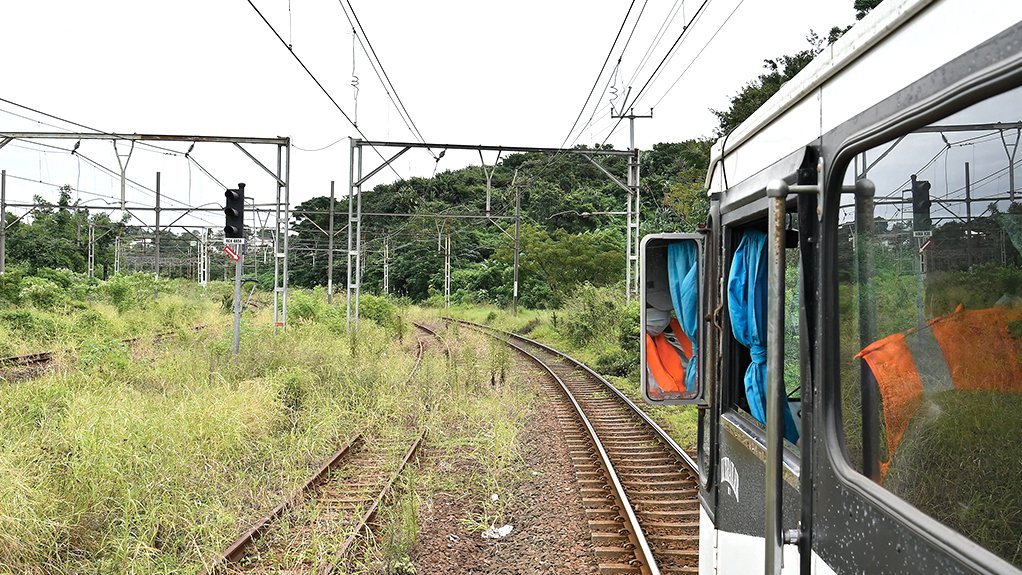Technology integral to transformation, logistics improvements, summit hears in sector overview


Technology can be used to mitigate challenges in the country's transport sector
Photo by Creamer Media's Donna Slater
South Africa’s transport and logistics systems are under strain, owing to factors including years of underinvestment, institutional inefficiency and policy misalignment; however, there are opportunities among the challenges, if the correct partnerships and innovations are pursued.
This was indicated by Transport Deputy Minister Mkhuleko Hlengwa, speaking on the second day of the Black Business Council in the Built Environment’s 2025 Indaba, held in Midrand last week.
Delivering a speech on the use of technological advancements to speed up an efficient transport and logistics infrastructure systems, he pointed out that, if the correct interventions were implemented, there was an opportunity to turn these sectors into a platform to empower small businesses, attract investment and bring the country’s resources more efficiently to regional and global markets.
Moreover, government was cognisant that it could not do this alone and required the participation of all stakeholders, including emerging contractors, the private sector, development finance institutions and black professionals in the built environment, Hlengwa emphasised.
He highlighted that, for the future of these sectors, technological innovations would become a great accelerator of infrastructure development and enable opportunities.
This includes examples such as smart systems to reduce travel times, AI to optimise trade logistics, drones to monitor road conditions and green technology to extend the lifespan of road services while reducing environmental impacts.
Hlengwa mentioned that government was undertaking myriad reforms and interventions in the transport and logistics sectors.
This includes a range of reforms being pursued in the ports and rail systems, with the Department of Transport collaborating with Transnet, and supported by the National Logistics Crisis Committee.
These aimed to streamline operations, reduce inefficiencies and integrate smart technologies into freight tracking, cargo handling and network management, he informed.
Hlengwa also emphasised the need to undertake steps to enable transformation in transport and logistics.
This was unpacked in a panel discussion following his speech, wherein mentorship was proffered as an important strategic tool for transformation.
It was highlighted that mentorship programmes could serve as a critical intervention to address systematic barriers, with the transport sector in particular indicated to be predominantly white male-dominated, and a lack of leaderships and technical roles for black youth and women in this space.
Mentorship could enable the transfer of skills, create confidence and empowerment for mentees and allow for network expansion.
Mentorship could be realised through means such as creating structured programmes, developing mentorship programme frameworks within organisations, collaborating with schools, universities and various professional bodies, and by incentivising mentors.
South African National Roads Agency Limited (Sanral) acting transformation manager Thandile Makgwabe pointed out that while the entity had done well in road construction and maintenance, it needed to do more in terms of transformation.
Therefore, Sanral’s board had made transformation one of its strategic pillars, requiring the entity to come up with different ways of doing things, he explained.
One of the interventions in this regard, which Sanral had already started rolling out, was a different procurement strategy for professional services and contractors. This aimed to address the lack of inclusivity and ensure that work was not limited to the same entrenched participants, Makgwabe informed.
Another intervention was the recently approved contractor development programme, which aimed to address the challenges faced by contractors in the “missing middle” of Construction Industry Development Board grades, focusing on grades 5CE to 7CE, he said.
A future initiative is set-asides, where certain projects would be reserved for women, youth, and other groups. This is currently in the development stage.
Article Enquiry
Email Article
Save Article
Feedback
To advertise email advertising@creamermedia.co.za or click here
Press Office
Announcements
What's On
Subscribe to improve your user experience...
Option 1 (equivalent of R125 a month):
Receive a weekly copy of Creamer Media's Engineering News & Mining Weekly magazine
(print copy for those in South Africa and e-magazine for those outside of South Africa)
Receive daily email newsletters
Access to full search results
Access archive of magazine back copies
Access to Projects in Progress
Access to ONE Research Report of your choice in PDF format
Option 2 (equivalent of R375 a month):
All benefits from Option 1
PLUS
Access to Creamer Media's Research Channel Africa for ALL Research Reports, in PDF format, on various industrial and mining sectors
including Electricity; Water; Energy Transition; Hydrogen; Roads, Rail and Ports; Coal; Gold; Platinum; Battery Metals; etc.
Already a subscriber?
Forgotten your password?
Receive weekly copy of Creamer Media's Engineering News & Mining Weekly magazine (print copy for those in South Africa and e-magazine for those outside of South Africa)
➕
Recieve daily email newsletters
➕
Access to full search results
➕
Access archive of magazine back copies
➕
Access to Projects in Progress
➕
Access to ONE Research Report of your choice in PDF format
RESEARCH CHANNEL AFRICA
R4500 (equivalent of R375 a month)
SUBSCRIBEAll benefits from Option 1
➕
Access to Creamer Media's Research Channel Africa for ALL Research Reports on various industrial and mining sectors, in PDF format, including on:
Electricity
➕
Water
➕
Energy Transition
➕
Hydrogen
➕
Roads, Rail and Ports
➕
Coal
➕
Gold
➕
Platinum
➕
Battery Metals
➕
etc.
Receive all benefits from Option 1 or Option 2 delivered to numerous people at your company
➕
Multiple User names and Passwords for simultaneous log-ins
➕
Intranet integration access to all in your organisation

















